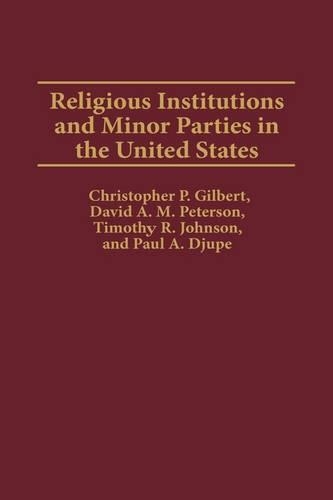
Religious Institutions and Minor Parties in the United States
(Hardback)
Publishing Details
Religious Institutions and Minor Parties in the United States
By (Author) Paul A. Djupe
By (author) Christophe P. Gilbert
By (author) Timothy R. Johnson
By (author) David Peterson
Bloomsbury Publishing PLC
Praeger Publishers Inc
30th March 1999
United States
Classifications
Tertiary Education
Non Fiction
Political parties and party platforms
Religion: general
324.273
Physical Properties
Hardback
192
Description
Gilbert et al. examine the impact of churches and church membership patterns on third parties and independent candidates on twentieth-century U.S. politics. Candidates who choose not to run for office under the rubric of a major party face a well-known set of obstacles, yet the absence of discussion about the interconnections between religious institutions and minor parties is striking. The book presents a theoretical framework for understanding how religious institutions create, support, and sustain the political culture of local communities; by playing this role religious institutions thus support major parties and impede the electoral changes of political outsiders. The book's central finding is that third candidates are not privy to the ties that bind Democratic and Republican voters to their parties; one of the factors that creates and strengthens such ties is religion. Therefore, third candidates do best where church and party loyalties are weakest, or where third candidates have existing bases of support. The rare third candidate or minor party that possesses a base of support centered around a denomination or religious group can overcome such barriers. These conclusions are supported by analysis of census data, election returns, and voter surveys spanning the twentieth century. Special attention is given to the 1992 and 1996 presidential candidacies of H. Ross Perot. An important analysis for scholars and other researchers dealing with American third parties and independent candidates and the impact of religion on politics.
Author Bio
CHRISTOPHER P. GILBERT is Associate Professor of Political Science at Gustavus Adolphus College - DAVID A. M. PETERSON is a Ph.D. candidate in political science at the University of Minnesota, where he has concentrated on American politics and methods - TIMOTHY R. JOHNSON is Assistant Professor of Political Science at Southern Illinois University-Carbondale, where he concentrates on Supreme Court decision making, constitutional law, and judicial processes - PAUL A. DJUPE is Assistant Professor of Political Science at The University of St. Thomas. His research interests center on church involvement and political behavior.
